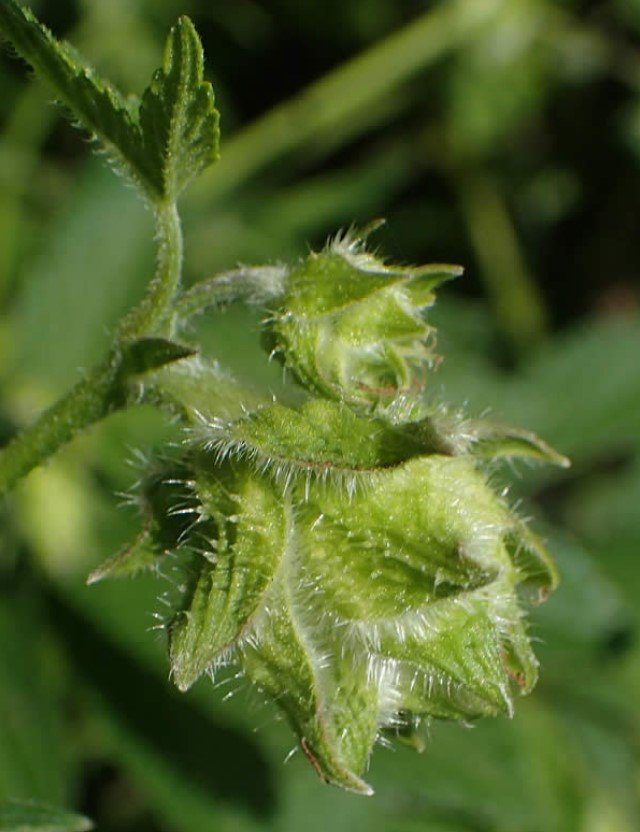Japanese hops (Humulus japonicus) are annual herbaceous vines loaded with broad leaves that look like an Indica plant. This species of Humulus is unlike any Hop a brewery would be familiar with; this plant can quickly grow up to 35 feet in a single growing season while twisting and climbing into both structures and vegetation surrounding it, all the while looking like one colossal Cannabis plant.
However, one should exercise caution with foliage we are unfamiliar with, even if it seems like it might bear some big fat nugs.
Cannabis and Humulus (hops) are two species of the little-known plant family of Cannabaceae. In blunt terms, Cannabis and hops are like cousins, sharing a key ingredient called terpenes that help them flavor their fruits that we enjoy in various ways. Hops get used in beer, but this Japanese species isn’t like the type used to create a frosty cold mug of brew.
 Japanese hops are native to Asia and have grown there for thousands of years, if not longer. They were introduced to America in the late 1800s for ornamental purposes but quickly took over riverbeds, displacing other desirable plant species and impeding forest regeneration. It appears that the U.S. gained seed to the plant for no purpose other than to watch it grow, unlike the Far East, which has a 10,000-year history of using plants as medicine.
Japanese hops are native to Asia and have grown there for thousands of years, if not longer. They were introduced to America in the late 1800s for ornamental purposes but quickly took over riverbeds, displacing other desirable plant species and impeding forest regeneration. It appears that the U.S. gained seed to the plant for no purpose other than to watch it grow, unlike the Far East, which has a 10,000-year history of using plants as medicine.
In Minnesota and many other states, this plant is considered a pest and has the state government spending millions trying to eradicate its growth; merely touching the plant causes many contact-dermatitis.
When it comes down to it, as pretty as Japanese Hops are, they’re known to overcome large areas with thousands of plants reproducing and causing a blanket of death to almost anything else trying to grow. Cultivation would be the answer, but why would someone cultivate a stinging, wild-looking plant like this? The answer in the United States is herbicides, which kill them off while destroying Mother Earth in the process.
Meanwhile, at the Chung-Ang University in Seoul, Korea, where these plants are native, researchers have been digging deep for years. In 2015, they reported that this perennial herb, Humulus japonicus, had been previously described in research studies as possessing both antituberculosis and anti-inflammatory properties. They then researched these extracts for anti-aging activity of ethanol extracts. They did this by analyzing the same leaves that cause humans a rash when touched. The findings revealed that sections of this plant contain flavonoids and other plant compounds that possess the potential to be used as high-efficacy anti-aging agents.
Seven years later, research emerged in January of 2022 from the same University, but this time, they had used the extract of the Japanese Hop for something very different. Many know that chronic stress affects our G.I. tracts, causing issues from I.B.S. to eventually lead to even more severe diseases. Prior research had already shown that the plant contains both inflammatory and antidiarrheal properties, so the team explored this further and came to findings that suggest the U.S. should look at harvesting Japanese Hops for medical research, rather than destroying them.
The findings of this study, “Ameliorative Effects of Humulus japonicus Extract” prove that the family Cannabacae has multitudes of plants that contain solid medicinal properties. Researchers found strong evidence that this wild, viney member of the Humulus genus of Cannabaceae can help people with severe gastrointestinal issues and suppress cytokines that cause inflammation.
But before we wrap up this exciting nugget of information regarding these not-so-rare, overwhelming, pest-like, and burdensome hops, let’s examine some other research:
-
In 2020, Researchers at Seoul National University published a study that showed the same weed has strong potential to create medicines for Rheumatoid Arthritis. These results suggest that Japanese Hops extract downregulates the induction of inflammatory mediators under both in vitro and in vivo inflamed situations, in other words this plant produces medicine we need.
-
In 2019, the original team at Chung Ang University published another study, documenting how this plant also reduces hypertension and treats non-alcoholic fatty liver disease (NAFLD). They then went further to prove that the extracts reduce oxidative stress.
Now, let’s return to the United States. Is this wild and crazy vine-like weed with a leaf that looks like Cannabis really causing such an issue? From what I can see, who knows how many hundreds of millions get spent on concerted efforts to kill a plant that can actually serve as a much-needed pharmaceutical?
There’s much more research needed on Japanese Hops, but the current environment surrounding this plant mimics what goes on with our beloved Cannabis. We all watch as plants are marginalized, minimized, and destroyed as Mother Earth’s and humankind’s future are jeopardized by so-called leaders destroying the beauty Earth has bestowed on us for healing.
Cannabaceae is Medicine; it’s time we harness the power of all the plants within the family, because Cannabis is just the tip of the iceberg. Multiple varieties of Humulus are known for medicinal properties, and the Japanese Hop has found its way into that collection. What a shame to think that these vines growing throughout America are considered nothing more than a burden when they possess their own goodness, ready to heal our aches, pains, moans, and groans. There seems to be quite a bit of madness over these vines; maybe it’s the shape of the leaves and their similarity to Cannabis that truly disturbs the mostly illegal states that wish to eradicate it.
It’s a bummer that Japanese Hops don’t have the potential to cure ignorance, or the ability to teach the powers-that-be about how Cannabis prohibition hurts America. If it did, we could make a special tea for U.S. Congress to drink while introducing them to the plant family Cannabaceae. Maybe one day they will learn like everyone else has, that weed didn’t come from a Hispanic girl in a movie. Instead, Mary Jane spread worldwide thousands of years ago and should be revered, rather than demonized.


